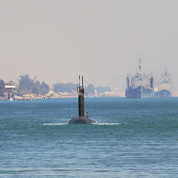Assessment of world economy’s losses from a potential Suez Canal blockade

In February, Venezuelan Oil Industry Minister Rafael Ramirez, whilst addressing a press conference in Caracas in February, said if the socio-political upheavals in Egypt would lead to the closure of the Suez Canal and the alternative Suez-Mediterranean (SuMed) Oil Pipeline (see info boxes), then the world oil price could skyrocket up to $200 per barrel. Such a price range, according to the minister, could spell a real disaster for the global economy that is just recuperating from an unprecedented financial meltdown.
This emotional statement by the Venezuelan oil minister and similar declarations by other top players and experts in global and national oil sectors stemmed from the fact that Egypt, legally speaking, formally controls the Suez Canal and related maritime navigation infrastructure that serve as ‘a vital transit gateway’ for shipping Middle East’s abundant ‘black gold’ to the global oil market, notably, to the United States and Europe.
Although the social and political protests of millions of Egyptians, discontent with the almost 30 years of President Hosni Mubarak, currently do not pose any major threat to the Suez Canal or SuMed Pipeline directly, the participants on both regional and global oil markets are, however, highly anxious over the possibility of the ‘contagious political instability in the biggest Arabian country spreading uncontrollably throughout the entire Middle East, and ultimately disrupting life activities in the region’s major oil producing states.
Such a negative scenario, in experts’ opinion, can lead to disruptions in normal functioning of the Suez Canal and its related maritime infrastructure. This can generate a number of unwanted problems for key players on the world oil market, including price hikes in costs of shipping oil from Middle East suppliers to international energy consumers, a negative development that can further aggravate the existing volatility on the global oil market.
Can these apocalyptic forecasts come true?
Now, the ultimate question is how far are such apocalyptic forecasts are justified by events on the ground? This publication is devoted to the search of answers to this question. To begin with, the negative consequences of potential disruptions in the Suez Canal operations, according to the general opinion of experts, will be very painful, but at the same time they will not be catastrophic for the global economy. Such view is premised on several factors. First of all, in spite of its importance to world trade, including sale of hydrocarbon products, the overall influence of the Suez Canal on global economy needs not be exaggerated, because today only about 8% of world’s maritime traffic passes through the Canal per year. Of course, this is a lot, but it is not large enough a volume to grind global trade to a standstill.
The Suez Canal is about 190km long waterway, connecting the Red Sea and the Suez Gulf with the Mediterranean Sea. It is a strategic transit passage for shipping oil from the Persian Gulf to Europe and Asia. Specifically, about 1.6mln barrels of liquid hydrocarbon products (or 0.4mln barrels of oil and 1.2mln barrels of oil products) are transported daily via the Suez Canal northward into the Mediterranean Sea, while about 0.8mln barrels (or 0.3mln of oil and 0.5mln of oil products) are shipped southward into the Red Sea for onward shipment to global consumers.
If we speak specifically about oil tankers, the total volume of oil passing the Suez Canal does not exceed 1.5mln barrels per day, which is less than 2% of the total daily global consumption. For obvious reasons, Europe is the main consumer of this oil. Even so, the potential closure of the Suez Canal will not be a disaster for Europeans, as only about 7-9% of the continent’s total oil needs are imported via this route. Thus, seen in this context, the Suez Canal today can be hardly called an ‘extremely important transit route’ for oil shipments to the global markets.
There is another aspect of oil tanker shipments via the Suez Canal that is also vitally important to note in this article. By modern standards, the Suez Canal marine passage is rather too “tight and shallow” to accommodate today’s modern large-capacity supertankers, which are consequently forced to go around the African continent with their cargoes. The cost of shipping oil and other cargoes via such alternative routes are not exorbitantly high, taking into account the fact that the freight costs of modern large-capacity oil vessels have fallen sharply over the last two years due to poor demand for such services caused by redundancy from the global financial crisis. Besides, the technical capabilities of modern large-capacity tankers allow them to go around Africa in just two weeks.
Let us not forget about one more moment, and that is the fact that apart from the Suez Canal, there is also the SuMed Oil Pipeline, which carries about 1mln barrels of oil to Europe daily. Besides, the inbuilt capacity of this pipeline can enable oil suppliers to double their current export volumes. In other words, this means a real alternative in case of abrupt disruptions in Suez Canal’s operations. Also, in a hypothetical case of this alternative “oil pathway” going out of operations, European consumers can meet their daily need of ‘black gold’ via boosting importations from Russia. The current utilization rate of the existing Russian pipelines and other related energy transportation facilities can allow this. Similarly, oil supplies to the continent can be increased via boosting supplies from Norway, another major energy supplier to the continental market.
World naval powers will likely protect the Suez Canal in critical conditions
Although legally speaking, the Suez Canal formally belongs to Egypt, the Suez marine route, according to international maritime laws and related treaties, can be used both in peace and war times by any vessel and under any flag. These documents allow international maritime forces in certain instances to intervene in case of imminent potential or real developments that could lead to disruptions of the Canal’s operations.
Thus, the Sixth Fleet of the U.S. Navy, based in the Mediterranean Sea, and the NATO warships on duty on the Gulf of Aden, protecting commercial vessels from Somali pirates, if needed, could transfer a part of their squadrons to protect the Suez Canal if the current forces fail or refuse to protect it as a  part of an international pressure on Mubarak regime.
part of an international pressure on Mubarak regime.
Also key warships of the Russian Armed Forces Navy, such as the big antisubmarine Admiral Chabanenko warship and the patrol frigate, coded “Neustrashimy, the Russian word for fearless, are also alternately on duty on the Gulf of Aden, where they ensure safe navigation from sea pirates in the Horn of Africa. These vessels can also be transferred to the Middle East as a part of adhoc international forces to maintain international agreements regulating the Suez maritime route.
An analysis of the above-listed facts will lead to one conclusion, and that is the events currently happening around the Suez Canal would not have any significant impact on oil prices in the long term. Here, it needs to be noted that the key emphasis is on the phrase, ‘in the long term,’ as the immediate negative impacts from any abrupt disruptions to the Canal’s operations will be rather dramatic, especially given the fact that oil players are exceptionally emotional people. However, after some market adjustments, everything would return to its normal natural course.
Meanwhile, one should hope for prudence among Egyptian protesters and that they will not provoke the anger of the international community and ‘saw off the bough on which the country is sitting.’ This is because the Suez Canal generates about $5bln for the Egyptian treasury every year, and this is about 10% of all the gross revenues generated by the state (see our special report devoted to the ongoing changes in Egypt, their importance for future the Arabic nation, the entire Middle-Eastern, Africa and the whole world in the April edition).
* The author is an analyst at the Moscow-based Center for Strategic Estimations and Forecasts.












 Web design,
Web design,